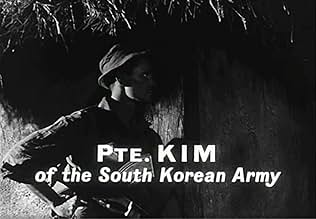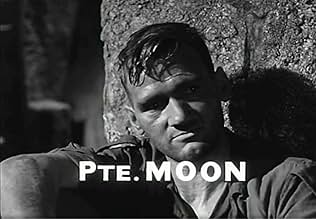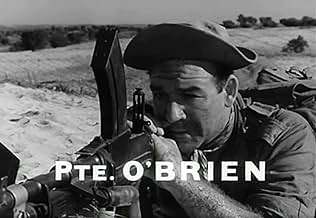During the Korean War retreat in 1951, a small British recon group is surrounded by Chinese troops and holds out in a lonely temple atop a hill.During the Korean War retreat in 1951, a small British recon group is surrounded by Chinese troops and holds out in a lonely temple atop a hill.During the Korean War retreat in 1951, a small British recon group is surrounded by Chinese troops and holds out in a lonely temple atop a hill.
Featured reviews
A war film starring Ronald Lewis, Stanley Baker, with no women characters, it sounds a gritty war film in the line of THE LONG, THE SHORT AND THE TALL, YESTERDAY'S ENEMY, another war movie starring Stanley Baker, or any Robert Aldrich or Samuel Fuller's films like plots. Rough, tough, brutal, virile stories about soldiers friendship, brotherhood of arms, sacrifice, bravery...And it is. I don't know the director but it is a pure delight to watch this war feature in the tradition of the small budget war features, focusing on characters, their relationships, their feelings.... Don't miss this one please, but I know it is a very hard to find item. And the most fascinating for me was having Stanley Baker and Robert Shaw together, bcause I have always associated them very close in my spirit; as Paul Newman and Steve McQueen, same kind of actors for same kinds of characters in the movies.
A Hill in Korea is a typical British war film, shot in crisp black and white and with Portugal doing a rather good job of standing in for the Korean countryside. The plot sees a British platoon cut off by Chinese forces and forced to take refuge on a hill which they must defend to the last man in the face of overwhelming attacks.
You know these sorts of films by now: half of the conflict comes from the besieging enemy, the other half from divisions within the group, as various characters crack or show their true heroic nature. And the low budget seems to work hand in hand with the plot of these films, helping to make them feel tense and claustrophobic. A Hill in Korea has a lot of casual racism in it, which was a bit of a surprise, but the all-star cast makes it worthwhile.
George Baker (TREAD SOFTLY STRANGER) is a dependable presence as the lieutenant leading the platoon, and Harry Andrews is once again the gruff sergeant - a role he seemed destined to play throughout his career. Ronald Lewis makes an impact as the guy going out of his mind, and others like Percy Herbert, Michael Medwin, and Stephen Boyd flesh out the rank and file troops. Best of all is the chance to see Robert Shaw and Michael Caine, both uncredited early on in their careers.
You know these sorts of films by now: half of the conflict comes from the besieging enemy, the other half from divisions within the group, as various characters crack or show their true heroic nature. And the low budget seems to work hand in hand with the plot of these films, helping to make them feel tense and claustrophobic. A Hill in Korea has a lot of casual racism in it, which was a bit of a surprise, but the all-star cast makes it worthwhile.
George Baker (TREAD SOFTLY STRANGER) is a dependable presence as the lieutenant leading the platoon, and Harry Andrews is once again the gruff sergeant - a role he seemed destined to play throughout his career. Ronald Lewis makes an impact as the guy going out of his mind, and others like Percy Herbert, Michael Medwin, and Stephen Boyd flesh out the rank and file troops. Best of all is the chance to see Robert Shaw and Michael Caine, both uncredited early on in their careers.
The Korean war seems to have posed a bit of a problem with film makers . It wasn`t untill Vietnam that screenwriters and directors tried to profound statements on the nature of conflict and wear their anti war sentiments on their sleeves. To all intents and purposes you could rewrite any Korean war film script without any problem . Indeed you could change the place names and you`d have the exact same story , and that`s the problem with A HILL IN KOREA , it could be set during the North African campaign of 1941 or the Burma campaign of 1942 or the Italian campaign of 1944 and it`d be the exact same film. The only telling difference is if it`d been set during the Second World War it would have starred John Mills.
It`s the casting of this film that makes it memorable, we have early roles for stalwarts of British cinema in the 60s and 70s: George Baker , Harry Andrews, Stanley Baker and Percy Herbert . And very early appearances by Robert Shaw , Stephen Boyd and Michael Caine ( Caine actually being an UN soldier in the Korean war ) who would all make it big in Hollywood. Sadly that`s the only memorable aspect on this film about " The forgotten war " . Forgotten that is except for the people who survived it
It`s the casting of this film that makes it memorable, we have early roles for stalwarts of British cinema in the 60s and 70s: George Baker , Harry Andrews, Stanley Baker and Percy Herbert . And very early appearances by Robert Shaw , Stephen Boyd and Michael Caine ( Caine actually being an UN soldier in the Korean war ) who would all make it big in Hollywood. Sadly that`s the only memorable aspect on this film about " The forgotten war " . Forgotten that is except for the people who survived it
It's 1951, and the Allies are on the retreat from the Yalu, with massive Chinese forces pursuing them south. A small unit of British troops is sent to reconnoitre a Korean village, and gets caught by two advancing Chinese battalions.
For all the formulaic treatment of soldiers maintaining a chirpy stoicism in adverse combat conditions, this film does have a certain gritty realism. George Baker as the rookie lieutenant burdened by command, and Harry Andrews as the tough old sergeant, are first-class. Don't blink, or you'll miss a very young Michael Caine as Private Lockyer, lamenting the death of Corporal Ryker (Stanley Baker).
The film works as a simple narrative of men under fire, but it certainly has some shortcomings. The narration which launches events may save the time and effort of explaining the plot, but would it not have been better for this information to emerge naturally out of the drama? When the hut explodes, there is a very obvious jump-cut. During the interval needed to get the actor out of the danger area, someone jolted the camera! Would the Chinese soldiers, even with their advantage in limitless canon-fodder, attack so recklessly across open, flat ground? At one point, close-ups are inserted to enhance the human reactions of the soldiers, but the trouble is, the lighting conditions do not match those of the master shot. Once the British soldiers retreat to the temple on the hill, the whole proceedings become totally studio-bound, with Shepperton fibreglass passing for buddhist architecture. The air strike relies too heavily on monotonously-repeated library footage of American planes. When the ending comes, it is a surprise in the wrong sense - the resolution is unconvincing, almost as if the film-makers didn't know how to extricate the soldiers. Surely a few bombs wouldn't clear the Chinese away for miles around?
Ronald Lewis plays Wyatt, the misfit who didn't want to be a soldier and who gets everything wrong. This character is needed in one sense, because there has to be some internal tension within the British camp, but Wyatt is not well done. His apostasy is overly-dramatic, and his immolation utterly unbelievable. This attempt to inject gaudy emotion into a basically stiff-upper-lip story just doesn't come off.
Verdict - Interesting 1956 British 'take' on recent war which ultimately succeeds, despite its flaws.
For all the formulaic treatment of soldiers maintaining a chirpy stoicism in adverse combat conditions, this film does have a certain gritty realism. George Baker as the rookie lieutenant burdened by command, and Harry Andrews as the tough old sergeant, are first-class. Don't blink, or you'll miss a very young Michael Caine as Private Lockyer, lamenting the death of Corporal Ryker (Stanley Baker).
The film works as a simple narrative of men under fire, but it certainly has some shortcomings. The narration which launches events may save the time and effort of explaining the plot, but would it not have been better for this information to emerge naturally out of the drama? When the hut explodes, there is a very obvious jump-cut. During the interval needed to get the actor out of the danger area, someone jolted the camera! Would the Chinese soldiers, even with their advantage in limitless canon-fodder, attack so recklessly across open, flat ground? At one point, close-ups are inserted to enhance the human reactions of the soldiers, but the trouble is, the lighting conditions do not match those of the master shot. Once the British soldiers retreat to the temple on the hill, the whole proceedings become totally studio-bound, with Shepperton fibreglass passing for buddhist architecture. The air strike relies too heavily on monotonously-repeated library footage of American planes. When the ending comes, it is a surprise in the wrong sense - the resolution is unconvincing, almost as if the film-makers didn't know how to extricate the soldiers. Surely a few bombs wouldn't clear the Chinese away for miles around?
Ronald Lewis plays Wyatt, the misfit who didn't want to be a soldier and who gets everything wrong. This character is needed in one sense, because there has to be some internal tension within the British camp, but Wyatt is not well done. His apostasy is overly-dramatic, and his immolation utterly unbelievable. This attempt to inject gaudy emotion into a basically stiff-upper-lip story just doesn't come off.
Verdict - Interesting 1956 British 'take' on recent war which ultimately succeeds, despite its flaws.
If nothing else this is a good little 50's British actioner. There's actually a couple of hills defended in the film. A smaller one in the first half by 4 of the soldiers and then a larger one in the second half, which is also the site of a Buddhist temple.
This is actually the first British war film I can remember seeing set in the Korean War. As others have mentioned, for a very much "B" feature, it has an A cast list, with the added bonus of seeing Robert Shaw and Michael Caine in a couple of their earliest roles. Keep your eyes peeled for Shaw, as his character doesn't last too long into the film.
It's a relatively brief film and the narrative doesn't delve much into the status of the platoon serving under the UN Flag, nor exploring to a great extent the fact that some of the soldiers were regular army and some were apparently national conscripts. The story really could have been fleshed out more. It's pretty lean and sparse, with very little backgrounding. But punters are unlikely to get bored watching it.
This is actually the first British war film I can remember seeing set in the Korean War. As others have mentioned, for a very much "B" feature, it has an A cast list, with the added bonus of seeing Robert Shaw and Michael Caine in a couple of their earliest roles. Keep your eyes peeled for Shaw, as his character doesn't last too long into the film.
It's a relatively brief film and the narrative doesn't delve much into the status of the platoon serving under the UN Flag, nor exploring to a great extent the fact that some of the soldiers were regular army and some were apparently national conscripts. The story really could have been fleshed out more. It's pretty lean and sparse, with very little backgrounding. But punters are unlikely to get bored watching it.
Did you know
- TriviaOpening credits prologue: "This film is dedicated to National Servicemen and Drafted Men of the Free Nations past, present and to come."
- GoofsThe troop enter a (mostly deserted) Korean village, finding a couple of innocent peasants. One soldier breaks the door of a shack, which the 'peasants' had booby trapped. The entry of the soldier and subsequent explosion are a jump cut, with the edit visible between the two shots, as the light and shadows had moved between filming each shot.
- ConnectionsFeatured in The Many Faces of...: Michael Caine (2011)
- How long is Hell in Korea?Powered by Alexa
Details
- Release date
- Country of origin
- Language
- Also known as
- An vorderster Front
- Filming locations
- Shepperton Studios, Shepperton, Surrey, England, UK(studio: made at Shepperton Studios. England.)
- Production companies
- See more company credits at IMDbPro
- Runtime
- 1h 20m(80 min)
- Color
- Aspect ratio
- 1.37 : 1
Contribute to this page
Suggest an edit or add missing content




































